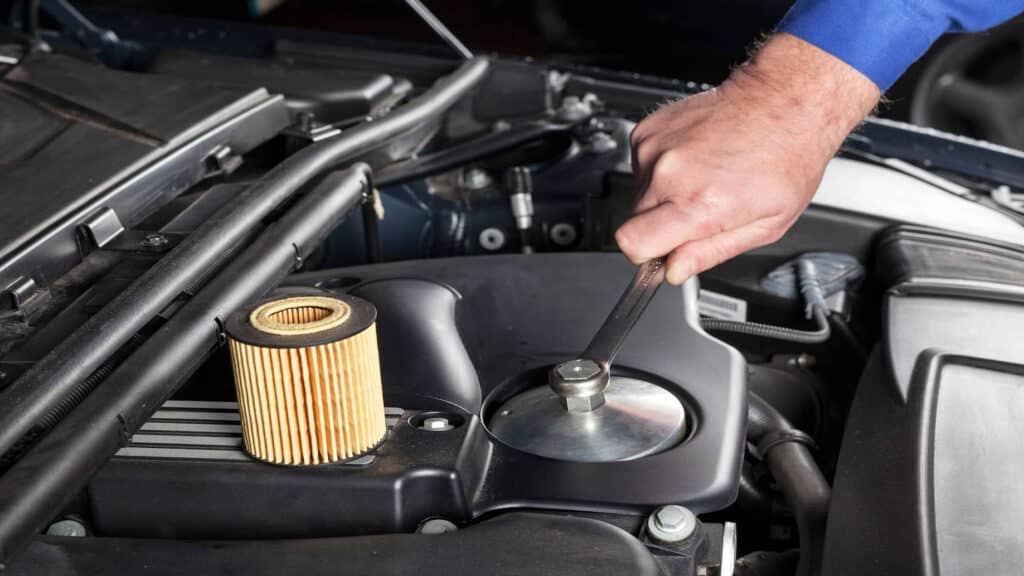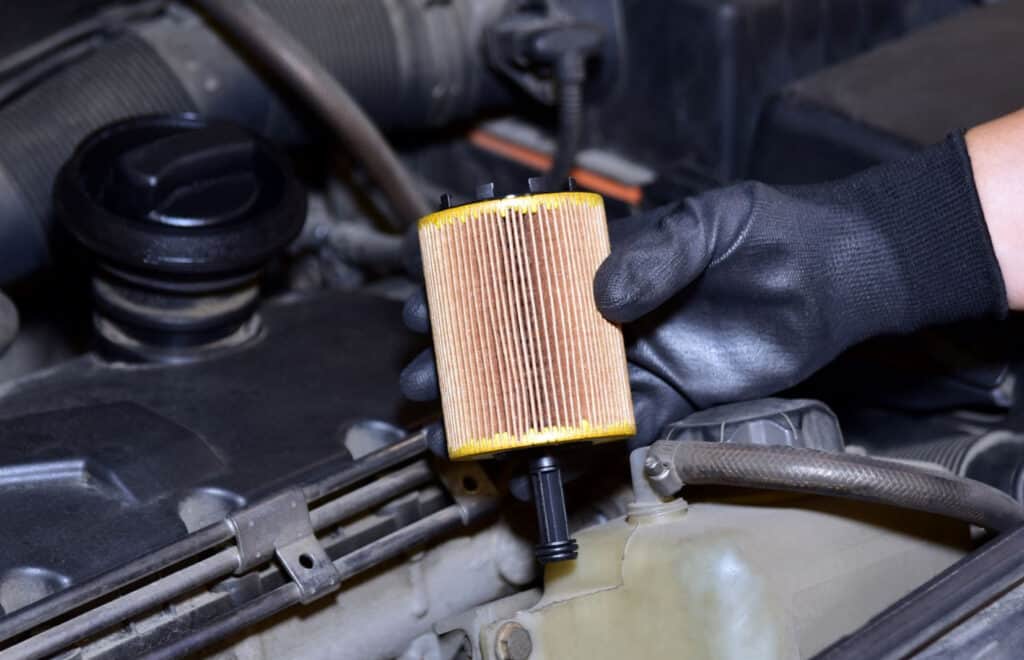Ever wondered what keeps your engine running smoothly, without metallic clatter or heat buildup? It’s the oil filter, a crucial component that ensures clean oil circulates through your engine. By removing dirt particles and other impurities, it prevents wear and tear and maintains the engine’s overall performance. Without it, your vehicle’s heart – the engine, would be in danger of premature failure.
How Much Will it Cost to Replace an Oil Filter in Canada?
While costs can vary depending on your vehicle’s make and model, an oil filter replacement in Canada generally costs between $15 to $25 for the part itself. Labour costs range from $20 to $40, based on a labour time of approximately half an hour. Therefore, the total cost you can expect is around $35 to $65.
What are the Symptoms of a Clogged or Faulty Oil Filter?
When your oil filter needs attention, your vehicle won’t stay silent. Here are some symptoms to keep an eye on:
• Decreased Engine Performance: As the oil filter becomes clogged, it can restrict the flow of oil, leading to a decrease in overall engine performance.
• Dirty Exhaust: If the oil filter isn’t doing its job properly, more particles will end up in the oil, which can cause the exhaust to become dirty or dark.
• Oil Pressure Warning Light: A clogged oil filter can cause the oil pressure to decrease, which may trigger the oil pressure warning light on the dashboard.

• Engine Noise and Knocking: Restricted oil flow due to a clogged filter can cause friction in the engine without enough lubrication, leading to noises like ticking, knocking, or metallic sounds.
• Sudden or Excessive Oil Consumption: If you notice your vehicle consuming oil more rapidly than usual, it could be due to a problem with the oil filter.
• Contaminated Oil: During an oil change, if the oil appears to be excessively dirty, it might be a sign that the oil filter is not functioning properly.
How Long Does an Oil Filter Last?
Typically, an oil filter is designed to last between 8,000 to 12,000 kilometers, or roughly every six months to a year. Of course, this depends on your vehicle’s manufacturer’s recommendation, the type of oil you use, and your driving habits.
How Does an Oil Filter Become Clogged or Defective?
• Regular Wear and Tear: Over time, as an oil filter captures more and more contaminants, it can become clogged. This is a normal part of the filter’s lifecycle.
• Poor Quality Oil: Low-quality oil can contain more contaminants than high-quality oil. Using poor quality oil increases the likelihood of the oil filter becoming clogged quickly.
• Extended Oil Change Intervals: Not changing the oil and oil filter as per the manufacturer’s recommendations can result in the oil filter getting clogged or worn out sooner.
• Frequent Short Trips: Short trips can lead to water vapor build-up in the oil, which can potentially lead to sludge formation in the oil filter.
• Dirt or Debris during Oil Change: If dirt or debris gets into the oil during an oil change, it can quickly clog the oil filter.
• Manufacturing Defects: Sometimes, an oil filter might be defective right from the manufacturing process. This could include problems like leaks, faulty valves, or other construction issues.
How Can a Clogged or Faulty Oil Filter Affect the Engine?
A clogged or faulty oil filter can be detrimental to your engine. It can cause:
• Increased Engine Wear and Tear: A clogged or faulty oil filter can’t efficiently remove impurities from the oil. This unfiltered oil circulating through the engine can lead to accelerated wear and tear of the engine components.
• Reduced Engine Performance: The reduced flow of oil caused by a clogged filter can lead to inadequate lubrication of the engine parts, potentially causing the engine to run less efficiently and reducing overall vehicle performance.
• Overheating: The oil filter helps to keep the engine cool by removing impurities that can cause friction and heat. A clogged filter can therefore cause the engine to overheat, potentially leading to serious engine damage.
• Possible Engine Failure: In extreme cases, a clogged oil filter can cause a drop in oil pressure to the point where there is not enough oil reaching the engine. This can result in engine failure.
• Unwanted Contaminants in the Engine: If an oil filter is faulty or bypassed due to blockage, unfiltered oil carrying dirt and foreign particles can enter the engine, leading to potential damage.
Is it Safe to Drive with a Clogged or Faulty Oil Filter?
Driving with a clogged or faulty oil filter is playing a risky game with your vehicle’s health. The oil filter serves a crucial role in maintaining the engine’s integrity by filtering out contaminants that may cause harm. When the filter is clogged or faulty, it can no longer perform this duty effectively, potentially leading to harmful debris circulating within your engine. This can result in inadequate lubrication, leading to increased friction between the engine parts. The consequences of this are elevated engine temperatures and accelerated wear and tear – conditions that are far from ideal for safe driving.
Moreover, if the oil filter becomes entirely blocked, it can cause a significant reduction in oil pressure. This reduction could lead to insufficient lubrication of the engine’s vital parts, causing them to wear out prematurely and potentially leading to engine failure. Besides, in extreme cases, the unfiltered oil might bypass the filter and bring dirt and foreign particles directly into the engine, causing further damage. Thus, it’s clear that continuing to drive with a clogged or faulty oil filter is not only unsafe but could lead to costly repairs or even require a complete engine replacement. To ensure your safety and your vehicle’s longevity, addressing oil filter problems as soon as they arise is of paramount importance.

How Can I Make My Oil Filter Last Longer?
• Regular oil changes: Adhere to your manufacturer’s recommendation for oil changes.
• Use high-quality oil: Premium oil often contains additives that help prolong the life of the oil filter.
• Drive responsibly: Aggressive driving can cause your engine (and oil filter) to work harder.
Can a Mobile Mechanic Replace an Oil Filter?
Absolutely! Many mobile mechanics offer oil filter replacement services. They can bring the necessary tools and parts right to your location, offering you convenience and professional service.
Conclusion: Importance of Regular Oil Filter Replacement.
Regular oil filter replacements are paramount in maintaining the performance and longevity of your engine. A small investment in preventative maintenance can save you from the potential headache and significant expense of engine repairs down the line.
Next Steps
Book Your Oil Filter Replacement Service
The service most frequently booked by those who read this article is Oil Filter Replacement. Uchanics’ expert technicians make the process even more convenient by bringing the service right to your doorstep. We perform this job at your home or office, covering over 40 cities in Ontario, including Oshawa, Ajax, Toronto, Scarborough, Mississauga, Brampton, and more. Our commitment to excellence has earned us more than 700 glowing 5-star reviews. Choose Uchanics for your Oil Filter Replacement and experience unparalleled convenience and top-quality service.
